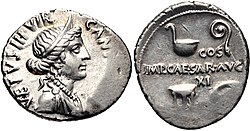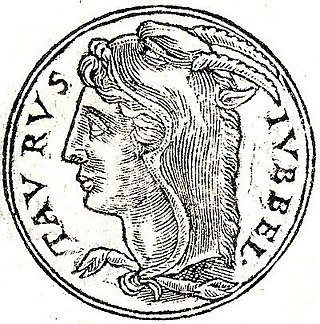
Gaius Antistius Vetus was a Roman senator active during the early Roman Empire, and a consul in 6 BC as the colleague of Decimus Laelius Balbus. [1]

Gaius Antistius Vetus was a Roman senator active during the early Roman Empire, and a consul in 6 BC as the colleague of Decimus Laelius Balbus. [1]
Antistius was the son of Gaius Antistius Vetus, consul in 30 BC. [2] Between 26 and 24 BC, Antistius participated in the Cantabrian Wars, serving with the Emperor Augustus for most of the campaign as a legate. Together with his colleague Gaius Firmius, they fought a difficult campaign to subdue the Gallaeci tribes of the more remote forested and mountainous parts of Gallaecia bordering the Atlantic Ocean, defeating them only after a series of severe battles, [3] though the details of this particular campaign remain unknown.
Due to the Emperor's illness, Antistius commanded the five legions of Rome at the Siege of Aracillum in 25 BC. Antistius served with Augustus at Amaya, Bergida, and Monte Vindio, and after the successful campaign, went on to become the provincial governor (Proconsul) of Hispania Citerior.
Antistius began his political career as a triumvir monetalis in 16–15 BC. [4] He returned to Rome to serve as consul, in 6 BC, and later he served as the Proconsul of Asia in either AD 2/3 or 3/4, assisted by his oldest son Gaius Antistius Vetus. [5]
His sons, Gaius and Lucius, became Roman consuls in the years 23 and 26 respectively. Velleius Paterculus notes that he was still living in AD 30. [6]

Publius Quinctilius Varus was a Roman general and politician under the first Roman emperor Augustus. Varus is generally remembered for having lost three Roman legions when ambushed by Germanic tribes led by Arminius in the Battle of the Teutoburg Forest, whereupon he killed himself.

Gnaeus Domitius Ahenobarbus was a member of the imperial Julio-Claudian dynasty of Ancient Rome. Domitius was the son of Antonia Major. He married Agrippina the Younger and became the father of the Emperor Nero.
Marcus Valerius Messalla Messallinus was a Roman senator who was elected consul for 3 BC.

Lucius Domitius Ahenobarbus was the son of consul Gnaeus Domitius Ahenobarbus and Aemilia Lepida. His mother was a paternal relative of the triumvir Marcus Aemilius Lepidus. His paternal grandmother was Porcia. Ahenobarbus married Antonia Major and through his son with her he became the grandfather of emperor Nero.
Octavia the Elder was the daughter of the Roman governor and senator Gaius Octavius by his first wife, Ancharia. She was the elder half-sister to Octavia the Younger and Roman Emperor Augustus.
Publius Cornelius Scipio was a Roman senator active during the Principate. He was consul in 16 BC as the colleague of Lucius Domitius Ahenobarbus. He was also proconsular governor of Asia, probably around the years 8/7 BC.
Marcus Plautius Silvanus was a Roman politician and general active during the Principate. He was consul in 2 BC as the colleague of the emperor Augustus.
Gaius Asinius Pollio was a Roman senator and orator active during the Principate. He was ordinary consul for 23 with Gaius Antistius Vetus as his colleague. He was the oldest son of Gaius Asinius Gallus; his brother was Marcus Asinius Agrippa, consul in 25. Pollio's mother was Vipsania Agrippina. Through her, he was the half-brother of the younger Drusus.

Titus Statilius Taurus was the name of a line of Roman senators. The first known and most important of these was a Roman general and two-time consul prominent during the Triumviral and Augustan periods. The other men who bore this name were his descendants.
Paullus Fabius Maximus was a Roman senator, active toward the end of the first century BC. He was consul in 11 BC as the colleague of Quintus Aelius Tubero, and a confidant of emperor Augustus.

The gens Antistia, sometimes written Antestia on coins, was a plebeian family at ancient Rome. The first of the gens to achieve prominence was Sextus Antistius, tribune of the plebs in 422 BC.
Gaius Calvisius Sabinus was a consul of the Roman Republic in 39 BC under the Second Triumvirate. He and his consular colleague Lucius Marcius Censorinus had been the only two senators who tried to defend Julius Caesar when his assassins struck on 15 March 44 BC, and their consulship under the triumvirate is taken as a recognition of their loyalty. An inscription, described by Ronald Syme as "one of the most remarkable inscriptions ever set up in honour of a Roman senator," praises Calvisius for pietas, his sense of duty or devotion. As a military officer, Calvisius is notable for his long service and competence, though he was not without serious defeats.
Lucius Marcius Censorinus was a consul of the Roman Republic in 39 BC, during the Second Triumvirate. He and his colleague Gaius Calvisius Sabinus had been the only two senators who tried to defend Julius Caesar when he was assassinated on the Ides of March in 44 BC, and their consulship under the triumvirate was a recognition of their loyalty.
Gaius Calvisius Sabinus was a Roman Senator, who was consul in AD 26 as the colleague of Gnaeus Cornelius Lentulus Gaetulicus. During the reign of Caligula, he was accused of conspiring against the emperor, and took his own life rather than submit to a trial.
Gaius Antistius Vetus was a Roman politician and general who was consul suffectus in 30 BC as the colleague of Augustus, succeeding Marcus Licinius Crassus.
Gaius Sentius Saturninus was a Roman senator and military officer who was appointed Roman consul in 19 BC. He served as the proconsular governor of Africa, and later as imperial governor of Syria. He then served several times as a senior military officer working with the future emperor Tiberius in campaigns against the Marcomanni, gaining the distinction of being awarded triumphal ornaments. Later he campaigned in Germania and Illyria.

Gaius Marcius Censorinus was a Roman Senator who was elected consul in 8 BC.
Quintus Sulpicius Camerinus Peticus was a Roman senator during the reign of Nero.
Aulus Licinius Nerva Silianus was a Roman senator, who was active during the Principate. He was consul in AD 7 as the colleague of Quintus Caecilius Metellus Creticus Silanus. Silianus was born the second of three sons of Publius Silius Nerva, consul in 20 BC, and was later adopted by Aulus Licinius Nerva. Velleius Paterculus salutes him for his simplicissimus.
Gaius Vibius Postumus was a Roman senator, who flourished under the reign of Augustus. He was suffect consul for the latter half of AD 5 with Gaius Ateius Capito as his colleague. Ronald Syme identifies him as a novus homo from Lavinum in Apulia. His brother Aulus Vibius Habitus was suffect consul in the latter half of AD 8.